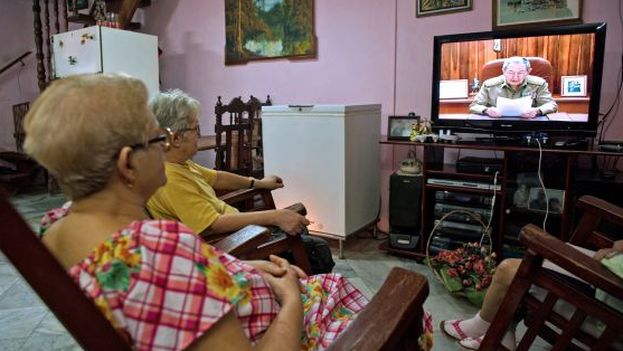
![]() 14ymedio, Generation Y, Yoani Sanchez, 6 January 2015 – Sometimes I wish I lived in the country they show on television. This hopeful nation of rose-colored dreams presented by the official press. A place of props and slogans, where factory production exceeds goals and employees are declared “workplace heroes.” In this Cuba, bouncing off the antennas to reach our small screens, there is no room for sickness, pain, frustration or impatience.
14ymedio, Generation Y, Yoani Sanchez, 6 January 2015 – Sometimes I wish I lived in the country they show on television. This hopeful nation of rose-colored dreams presented by the official press. A place of props and slogans, where factory production exceeds goals and employees are declared “workplace heroes.” In this Cuba, bouncing off the antennas to reach our small screens, there is no room for sickness, pain, frustration or impatience.
The official Cuban press has tried to approach the country’s reality in recent years. Several young faces appear on TV programs to report on administrative negligence, poor services, or consumer complaints about bureaucratic paperwork. But even still, state journalism continues to be a long way from objectivity and respect for the truth.
Television, radio and newspapers are maintained under strict monopoly of the Communist Party, and not only because they are ideologically subordinated, but also because they are financed from the state coffers – money that belongs to all Cubans – money that they use to sustain a biased editorial line that does not reflect the national complexity.
The topics covered by the journalists of this partisan press represent the interests of an ideology and a group in power, not of the entire country. They never dare, for example, in their reporting, to question the authorities, nor the current political system, nor the organs of State Security nor the activities of the police, among other taboo subjects.
However, where the official press most betrays the precepts of balance and impartial information is in the testimonies they broadcast, in the voices they give space to and the opinions they express. By the grace of journalistic censorship, access to the microphone is granted only to those who agree with the government and applaud the actions of its leaders.
They never interview someone with a difference of opinion, or someone who believes the country should take other political or economic paths. Unanimity continues to fill the front pages and the news broadcasts, although for a long time now loud dissent has been heard on buses, in stores, in the hallways of institutions and even in classrooms.
At the beginning of this year an avalanche of reports filled the television broadcasts. The protagonists were young people who claimed to live “in the best of all possible worlds,” smiling with confidence in their future and not even dreaming of emigration. Not included among the opinions were those from anyone in the process of leaving Cuba, or feeling frustrated by their professional prospects, or submerging themselves in illegalities to survive.
In the almost 70,000 hours of annual television broadcasts not a single self-employed person complains about their high taxes. Parents who fear the growing violence in Cuban streets are never encountered in the Cuban media, and women beaten by their husbands don’t appear demanding legal measures to protect them from the abuse.
The teachers whose pay doesn’t allow them to live a decent life find no echo of their demands in the media, nor do dissidents appear to demand respect for their opinions. An inmate denouncing bad prison conditions has no chance to appear before the cameras, nor do the patients who have been victims of medical ethics violations or bad treatment in the Public Health System.
This entire area of Cuba, the widest area, remains outside the authorized media. Because the official Cuban press doesn’t exercise journalism, rather it proselytizes. Although it is made up of many professionals with university and post-graduate degrees, they do not have the freedom to engage in the work of reporting. Instead of looking for the truth, they try to impose an opinion. What they do cannot even call itself “the press.”
